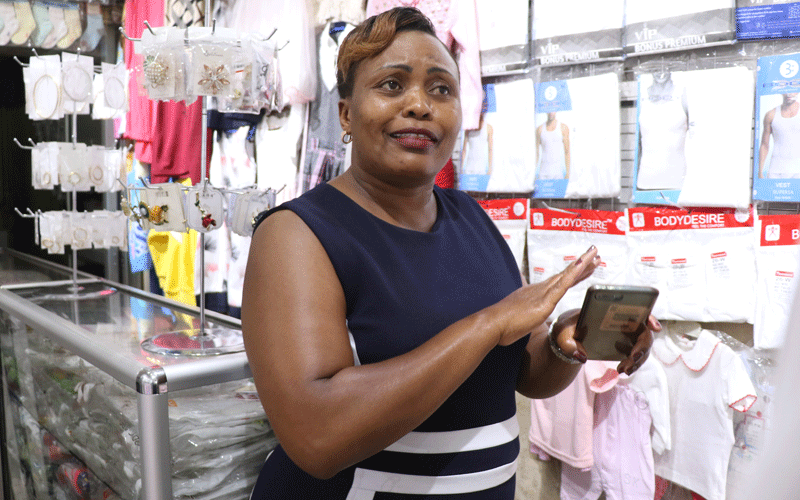Traders stare at collapse of ventures as corona spreads

The seismic effect of the coronavirus has hit businesses across the country with operators staring at collapse of enterprises they have painstakingly nurtured in a tough economic environment.
With confirmation of four cases in the country and subsequent roll-out of a raft of measures to tame the deadly respiratory flu, the small-scale businesses immediately felt the impact of the ban on public gatherings and crowding.
And yesterday, a spot check in Nairobi and other parts of the country showed that business premises had closed while those that remained open witnessed little activity as most people kept away for fear of contracting the virus.
For Beatrice Wangui, a businesswoman in Nairobi’s central business district (CBD), and her two employees at her beauty shop on Taveta Lane, the reality of the effects of the virus is fast dawning on them.
She runs a well-stocked Bodycare Beauty shop, but she is unsure of what tomorrow holds for her and her business.
She now prays that the virus scourge that is sweeping the globe is one of those bad dreams that soon disappear.
The virus, known as Covid-19, has paralysed the world, claimed more than 7,000 lives and infected close to 180,000 by yesterday evening.
Confirm case
“The number of people walking into my shop and even on the streets has gone down drastically. Since morning I have sold to only two people and the sales are not even Sh1,000.
This is unlike last week when by this time, I would have made up to Sh5,000 on a bad day,” Wangui told People Daily.
This has been the story since last Friday when the first case was confirmed in the country.
Wangui said when the government announced the first case of Covid-19, the flow of clients went down by about 40 per cent, but this plunged further after President Uhuru Kenyatta confirmed two more cases on Sunday.
In her estimation, her business has plummeted by 80 per cent.
She says most people heeded the President’s message to stay away from congested places, saying the number of people entering the CBD had reduced drastically.
Another businesswoman, Mercy Limo, who runs a boutique shop at Adams Arcade, said her clientèle has virtually dried out and now wants to close her shop until the corona situation improves.
“I find it a waste of time to keep coming here, and all I do is stay idle in the shop because there are no clients.
The number of people in the city is reducing each day and it’s only sensible to stay at home until the situation normalises,” she said.
Close shop
Wangui and Limo’s situation illustrates the economic effects of the virus, with shop owners as well as service providers, both large and small, complaining of shrinking sales, a reality will force most to close shop.
On Nairobi’s River Road, a popular small-scale business district, some of the shops were closed.
But in Muthurwa, a mixed opened air market, the traders opened their ventures despite the low number of customers.
“Everybody has opened, but the number of people coming to buy is small compared to last week,” said Njeri Mwangi, who runs a music shop in Muthurwa.
The President’s caution to Kenyans to avoid congested areas, social and shopping spots coupled with scaling down of activities by government and companies has been blamed for the reduced number of customers.
It has caused a ripple affect that has affected wholesale and retail businesses alongside the hospitality sector, which has been hard hit by closure of entertainment spots and suspension of flights into the country.
Western Kenya Hospitality leaders’ Association chairman Robinson Anyal said the sector has been adversely hit by the deadly virus pandemic leading to notable decrease in the overall business performance.
He said a number of the region’s hotels, including the high-end ones are operating between five to 10 per cent-bed occupancies from an average of between 50 and 60 per cent in the last two months.
“About 90 per cent of the bookings we had anticipated have been cancelled, leaving us only hosting small meetings of ten people and below,” Anyal told People Daily yesterday.
Flower exports to the Europe, now the epicentre of the virus, have a dropped by close to 50 per cent in the last few weeks because of coronavirus.
Combat spread
Kenya Flower Council CEO Clement Tulezi said only 50 per cent of the country’s flower production was accessing the EU market.
Major markets of Nairobi and its environs which depend on meat supply from Kajiado county are expected to experience a major shortage after the county closed the cattle market in an effort to combat spread of Covid-19.
Governor Joseph Ole Lenku said after wide consultation, it was established that the cattle business exposes residents beyond the region and can easily spread the virus.
But even as the other businesses suffer, the transport sector has been making a kill from the situation.
Yesterday, matatu termini in the Nairobi CBD were a hive of activities as Kenyans who are afraid of the ailment started fleeing the capital and as many learners made their way home.
Omar Abdul, the manager of Mash Poa which plies the Nairobi-Mombasa route, said they had recorded huge increase of passengers, most of them students.












